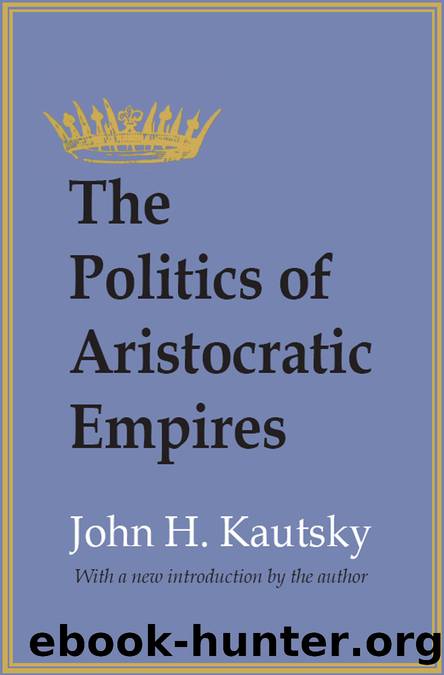The Politics of Aristocratic Empires by John H. Kautsky

Author:John H. Kautsky [Kautsky, John H.]
Language: eng
Format: epub
Tags: Political Science, General, Political Ideologies
ISBN: 9781351303262
Google: _ck3DwAAQBAJ
Goodreads: 3367455
Publisher: Routledge
Published: 1982-01-01T00:00:00+00:00
Notes
1. The motto of the Prince of Wales is: âIch dienâ (I serve). This does not mean that the Prince of Wales is a Diener, a servant, or, for that matter, a serf. Obviously, the word has very different connotations, as it still does today when servants may be lowly, but leaders of governments are public âservants,â bureaucrats are civil âservants,â and military men âserveâ in the armed âservices.â
2. Quoted in Bellah, Tokugawa Religion, p. 91.
3. Vagts, A History of Militarism, p. 68. On âstatus honorâ in a number of aristocratic empires, see also Weber, Economy and Society, 3:1104â5.
4. Maquet, âThe Kingdom of Ruanda,â p. 179. Maquet ends his paragraph by noting that âan aristocratic caste usually emphasizes those differences which constantly remind others how far removed they are from the noble setâ (ibid., p. 180).
5. Levine, Wax and Gold, p. 156.
6. Geertz, The Religion of Java, p. 247.
7. âThese li⦠were designed to cover all the major activities of life and required much time to learn. On the military side they remind us in some ways of the code of chivalry of European knighthood.â Bodde, âFeudalism in China,â p. 59.
8. Maquet, âThe Kingdom of Ruanda,â pp. 178â79.
9. Varley, The Samurai, p. 123.
10. Ibid., pp. 123â25. The bushido was formulated in the Tokugawa period, when Japan was no longer traditional and when the samurai âwere in fact warriors who had no wars to fightâ (ibid., p. 121), but it embodied the values of their idealized warrior past. On the bushido and its emphasis on loyalty, see also Bellah, Tokugawa Religion, pp. 90â98. He says of this code that âthe military emphasis is crucial. Military service⦠typifies selfless devotion to the collectivity and its head, even to the point of death. Death indeed in a military context can come to symbolize that very devotionâ (ibid., p. 97). On the samurai, see also the beautifully illustrated Turnbull, The Samurai.
11. Glory, according to Schopenhauer, âmust be acquired, but honor must not be lost.â Vagts, A History of Militarism, p. 70.
12. Gouldner, Enter Plato, p. 12.
13. Bloch, Feudal Society, p. 294.
14. Bendix, Kings or People, p. 228.
15. Ibid., p. 231. The prevalence of violence among aristocrats is illustrated by the fact that among the sons of English dukes born between 1330 and 1479âwhen, to be sure, England was no longer traditionalâ46 percent died violent deaths. The life expectancy of male members of ducal families born in this period was twenty-four years. Omitting violent deaths, however, it was thirty-one years. Hollingsworth, âA Demographic Study of the British Ducal Families,â pp. 8â9.
16. Vagts, A History of Militarism, p. 42. The quotation is taken from Edgard Boutaric, Institutions militaires de la France (Paris: Henri Plon, 1863), p. 212. According to Shakespeare, the death in battle of common men who fought in the Hundred Years War was no joke, but it did remain an embarrassment to the aristocrats. When the French herald asks for an armistice at the battle of Agincourt (1415), it is
To book our dead, and
Download
This site does not store any files on its server. We only index and link to content provided by other sites. Please contact the content providers to delete copyright contents if any and email us, we'll remove relevant links or contents immediately.
The Secret History by Donna Tartt(19088)
The Social Justice Warrior Handbook by Lisa De Pasquale(12190)
Thirteen Reasons Why by Jay Asher(8909)
This Is How You Lose Her by Junot Diaz(6886)
Weapons of Math Destruction by Cathy O'Neil(6279)
Zero to One by Peter Thiel(5801)
Beartown by Fredrik Backman(5754)
The Myth of the Strong Leader by Archie Brown(5507)
The Fire Next Time by James Baldwin(5444)
How Democracies Die by Steven Levitsky & Daniel Ziblatt(5218)
Promise Me, Dad by Joe Biden(5153)
Stone's Rules by Roger Stone(5087)
A Higher Loyalty: Truth, Lies, and Leadership by James Comey(4962)
100 Deadly Skills by Clint Emerson(4925)
Rise and Kill First by Ronen Bergman(4788)
Secrecy World by Jake Bernstein(4753)
The David Icke Guide to the Global Conspiracy (and how to end it) by David Icke(4717)
The Farm by Tom Rob Smith(4507)
The Doomsday Machine by Daniel Ellsberg(4490)
